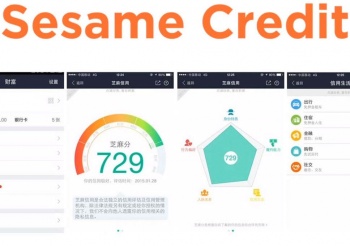Social Credit System
The Social Credit System is a system being developed by the Chinese government, aimed to assess and place a score on citizens' and businesses' social and economic reputation. With this standardized system, the Chinese government has been reportedly using it as a basis for punishing blacklisted individuals by denying access to train and plane tickets, and preventing their children from enrolling in certain private schools and universities. Certain information about blacklisted citizens is displayed publicly as a form or public shaming.
Contents
Outsourcing Data Tracking
The Chinese government has outsourced pilot projects to 8 different private companies, tasked to track data and issue their own social credit scores on citizens. Of the 8 companies, there is Sesame Credit (Alibaba Corp), Tencent, Baihe, and Didi Chuxing, all owned and operated by major multi-billion dollar Chinese corporations.
Ethical Implications
Limited Freedoms
Debtors in China are placed on a public blacklisted, being labeled as dishonest by the government. They are restricted from buying train and plane tickets, or any high expenditures that aren't necessary for day-to-day life. This publicly available information can affect individuals when applying for jobs and for loans. These restrictions have drawn further controversy because of their cross-generational impact; children of blacklisted individuals may be restricted from enrolling in certain private schools and colleges. To avoid government tracking, some individuals have resorted to plastic surgery to hide from surveillance cameras.
Loss of Privacy
Sesame, owned by Alibaba, monitors users payments through Alipay and e-commerce purchases. Using this information, Sesame is able to create profiles on the users, and attribute judgements of character, like a degree of responsibility or trustworthiness. Baihe, China's most popular dating app with more than 90 million users, partnered with Sesame to display users' social credit scores on their profiles. The trend of publicly flaunting ones' scores, being strongly encouraged by the government and companies like Baihe, are an effort to guide the public to be more open and honest about private information. Citizens placed on government blacklists have certain information displayed online, and have their pictures shown before movies and in other public settings.
Misconceptions in Western Media
Vice President Pence said during a speech addressing China's human rights abuses, “In the words of that program’s official blueprint, it will ‘allow the trustworthy to roam everywhere under heaven while making it hard for the discredited to take a single step.’” Media and news outlets spread the popular narrative that the Chinese government is developing an "Orwellian" system, punishing dissidents and infringing upon privacy. However, the Chinese government maintains that the goal of the program is to fight business fraud and corruption, and promote honesty and morals amongst citizens.
Comparisons to Other Governments
In Chile, the Directory of Commercial Information (DICOM) developed during the Pinochet dictatorship, restricted citizens with lower scores from getting loans, buying property, and finding jobs. In Russia, the government plans to digitize the government by documenting individuals' economic successes and failures.
References
[1] https://www.businessinsider.com/chinas-tax-blacklist-shames-debtors-2017-12?r=UK https://www.cnbc.com/2017/03/16/china-social-credit-system-ant-financials-sesame-credit-and-others-give-scores-that-go-beyond-fico.html
https://www.wired.com/story/china-social-credit-score-system/- ↑ Hatton, Celia · (2015-10-26) · China 'social credit': Beijing sets up huge system · BBC News · 03-17-2020
